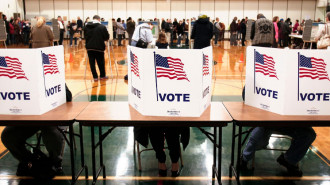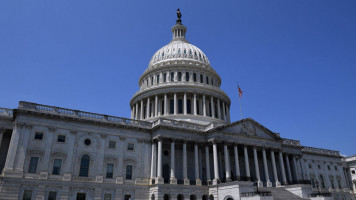Iran nuclear talks stall in last minute drama
Iran nuclear talks stall in last minute drama
Nuclear talks appear between Iran and world powers seem to have reached an impasse, as a sense of frustration grips diplomats in Vienna.
2 min read
Nuclear talks appear to have reached an impasse [Anadolu]
In one day's time, a deadline for Iran's nuclear negotiations will expire.
Experts and politicians have been busy drawing up a complicated nuclear non-proliferation agreement aimed at allievating fears that Iran wants to develop a nuclear weapon.
The text of the agreement is believed to be at least 20 pages long, accompanied by as many as five complicated technical annexes.
However, despite the frantic work behind the scenes, Western diplomats have accused Iran of trying to "wiggle its way out" of a nuclear deal at the last minute.
Flight to Tehran
While negotiations go on Vienna, Iran's foreign minister, Mohammed Zarif, flew back to Tehran on Sunday to consult the leaders who have the final say on whether the deal will go through.
A US diplomat has suggested that the negotiations will likely be extended past the 30 June deadline.
EU foreign policy chief Federica Mogherini has said that "postponement is not an option".
"I would say that the political will is there. I've seen it from all sides," Mogherini added. "We have conditions now to close the deal".
UK's foreign minister, Phillip Hammond, is less optimistic: "no deal is better than a bad deal".
Comments such as these, and the cagey response about the talks by US Secretary of State John Kerry make an extension appear almost inevitable.
It comes after months of successful discussions between Tehran and the P5+1 group [US, France, Russia, China, UK and Germany].
Last week, Iran's supreme leader, Ayatollah Khamanei, hardened his stance against US demands and said that lifting sanctions must precede any Iranian actions on its nuclear programme.
Meanwhile, it was reported that Barack Obama has sent a message to Iran's leadership through Iraqi prime minister Haider al-Abadi.
However, according to Iranian state media, Fars News, many in the Iranian leadership are unhappy with US double standards at play - dovish sentiments in secret letters and more hawkish rhetoric in public.
But the general consensus appears to be is that even if the deadline is missed, a deal will be reached.
Experts and politicians have been busy drawing up a complicated nuclear non-proliferation agreement aimed at allievating fears that Iran wants to develop a nuclear weapon.
The text of the agreement is believed to be at least 20 pages long, accompanied by as many as five complicated technical annexes.
However, despite the frantic work behind the scenes, Western diplomats have accused Iran of trying to "wiggle its way out" of a nuclear deal at the last minute.
Flight to Tehran
While negotiations go on Vienna, Iran's foreign minister, Mohammed Zarif, flew back to Tehran on Sunday to consult the leaders who have the final say on whether the deal will go through.
A US diplomat has suggested that the negotiations will likely be extended past the 30 June deadline.
EU foreign policy chief Federica Mogherini has said that "postponement is not an option".
"I would say that the political will is there. I've seen it from all sides," Mogherini added. "We have conditions now to close the deal".
UK's foreign minister, Phillip Hammond, is less optimistic: "no deal is better than a bad deal".
Comments such as these, and the cagey response about the talks by US Secretary of State John Kerry make an extension appear almost inevitable.
It comes after months of successful discussions between Tehran and the P5+1 group [US, France, Russia, China, UK and Germany].
| No deal is better than a bad deal. - Phillip Hammond, UK foreign secretary |
Last week, Iran's supreme leader, Ayatollah Khamanei, hardened his stance against US demands and said that lifting sanctions must precede any Iranian actions on its nuclear programme.
Meanwhile, it was reported that Barack Obama has sent a message to Iran's leadership through Iraqi prime minister Haider al-Abadi.
However, according to Iranian state media, Fars News, many in the Iranian leadership are unhappy with US double standards at play - dovish sentiments in secret letters and more hawkish rhetoric in public.
But the general consensus appears to be is that even if the deadline is missed, a deal will be reached.

![Palestinians mourned the victims of an Israeli strike on Deir al-Balah [Getty]](/sites/default/files/styles/image_684x385/public/2024-11/GettyImages-2182362043.jpg?h=199d8c1f&itok=xSHZFbmc)


![The law could be enforced against teachers without prior notice [Getty]](/sites/default/files/styles/image_684x385/public/2178740715.jpeg?h=a5f2f23a&itok=hnqrCS4x)
 Follow the Middle East's top stories in English at The New Arab on Google News
Follow the Middle East's top stories in English at The New Arab on Google News


